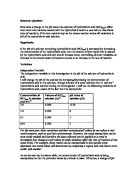Materials:
- 250ml flask
- 1-hole stopper with gas collection tube
- 4.5 grams of sodium carbonate-deca-hydrate
0.5 for each trial (± 0.005g)
- Explorer GLX with pressure sensor (±1.75kPa)
- Laptop with Data Studio
- Stop watch (± 0.005s)
- 135ml of hydrochloric acid
45ml of each concentration (±1ml)
- Balance
Picture:
Method:
There will be three trials for each of the three different concentrations of hydrochloric acid. Using 9 weighing boats and the balance split the sodium carbonate-deca-hydrate into 9 sets of 0.50g.
- First, set up the data studio and GLX explorer on the laptop. Once the pressure sensor is plugged in the GLX a blank graph should show up. Under “setup” in data studio, change the rate of measurement to every 1 second.
- Pour 15ml of 0.5molar hydrochloric acid into the 250ml flask.
- Click the play button on the GLX explorer to start the measurements, and immediately drop the 0.50 grams of sodium carbonate-deca-hydrate into the hydrochloric acid; right after cover the flask with the one hole stopper.
- There should be a stop watch on the data studio software, and after 90 seconds stop the measurements by pressing play on the GLX explorer.
- Save the file as 0.5molar trial 1.
- Clean out the flask and repeat steps 1 through 5 two more times, for trials 2 and 3.
- After three trials are recorded and saved for 0.5molar hydrochloric acid. Repeat these steps for 0.75molar and 1molar hydrochloric acid.
Overall, you will have a total of 9 different graphs on data studio. These graphs will later be interpreted by applying a tangent line to the beginning of each graph. This tangent line will show the rate of the reaction (sufficient relevant data).
Results:
The graphs from the GLX explorer are shown in the appendix at the end of the lab roport. A tangent line (slope line) was used on the beginning of the graphs to get the rate of the reaction. The slope of the tangent line would be the rate of the reaction at the point where the tangent line meets the curve.
Table 1: The Rate of the Reaction Concerning the Concentration of the Hydrochloric Acid
Qualitative Results:
- The reaction released a lot of gas. I noticed this because at first the reaction was being done in a test tube and then the one-hole stopper popped off in the middle of the reaction, resulting in a switch to use a flask.
- When the molarity of the hydrochloric acid was higher, there was a much louder fizzing noise, indicating a faster reaction.
- For some cases no all the sodium carbonate-deca-hydrate reacted fully.
- Not all the sodium carbonate-deca-hydrate which was added to the hydrochloric acid was crushed to powder.
Graph:
Calculations:
Percentage Uncertainty:
Concentration:
(0.01/0.50) x 100% = 2.0%
(0.01/0.75) x 100% = 1.3%
(0.01/1.00) x 100% = 1.0%
Average Rate of Reaction:
(0.05/1.00) x 100% = 5.0%
(0.05/1.30) x 100% = 3.8%
(0.05/2.30) x 100% = 2.2%
Total Percentage Uncertainty: 15.3%
Percentage Error:
Using sodium carbonate deca hydrate was a limitation to this experiment beacsue this made it extreamly hard to calculate the theoretical value of the reaction. Therefore, one cannot tell weather the lab had a systematic error and a random error.
Conclusion:
Overall, the hypothesis held correct. Clearly shown from the results, the rate of the reaction was much faster when the molar concentration of the reaction was greater. The rate of the reaction was measured using a pressure sensor, and as the rate of the pressure would indicate the rate of the reaction. For the one molar concentration of hydrochloric acid the rate of the reaction was about twice as fast as the half molar concentration. This can clearly be explained through kinetics. The more concentrated one of the reactants is the more particles there will be. Therefore, when there are more particles more collisions will occur and with more collisions the chances of the collisions being greater than the activation energy will also increase. Overall this increases the rate of the reaction.
Evaluation:
Overall, this experiment went very well; however, there were numerous limitations which affected the results. One very clear and important limitation is the fact that not all the sodium carbonate-deca-hydrate was powder. During the experiment, 0.50 grams of sodium carbonate-deca-hydrate was collected for each trial of the experiment. However, not all the sodium carbonate-deca-hydrate was powder, as there were some larger pieces. This changes the surface area of the reactant and that would have a greater affect on the results. For example, if one of the trials had 0.50 grams of sodium carbonate-deca-hydrate and there was a big piece of that substance, than the surface area of those 0.50 grams would be less than the surface area of the trial that had all powder substance. With a larger surface area there would be fewer collisions which would make the rate of the reaction slower. Directly affecting the results, this limitation would need to be improved. A realistic improvement to this experiment would be to simply use a bowl and crush all the sodium carbonate-deca-hydrate to powder. Therefore, there would be no big pieces and the surface area would be relatively the same in each trial.
Another limitation to this experiment would be the fact that the sodium carbonate-deca-hydrate was poured into the test tube right before the one hole stopper was placed on the test tube. Therefore, there was a small time frame where gas was lost. This would affect the pressure in the test tube. One simple way to improve this limitation would be to use a special test tube. with this special test tube there should be a small hole on the side where another tube comes out and that is where the sodium carbonate-deca-hydrate would be placed in. Therefore, there would be minimal or no gas escaping and the results would not be affected by a drop in pressure.







